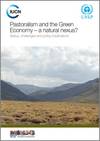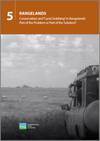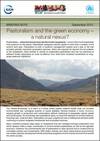This video shows some of the main challenges of the Raikas, a semi nomadic community in Rajasthan, India and how ICARDA responds to them. Change of land use, climate change and little social recognition for mobile livelihoods make it harder for the Raikas to find water and pasture.
Year of publication: 2014Organization: Auteurs individuels
Topic: Changement climatique, Économie, Régime foncier
Language: English
Type of document: Vidéos
Geographical coverage: Asie du Sud
Cette étude met l'accent sur le potentiel actuel et futur de l'élevage pour réaliser une gestion durable et des résultats de l'économie verte provenant des parcours du monde. Elle synthétise les données existantes et utilise des exemples pratiques du pastoralisme en Europe, en Amérique latine, en Amérique du Nord, en Asie centrale, occidentale et Australe, en Australie et dans toute l'Afrique pour démontrer les caractéristiques inhérentes au système pour une durabilité adaptative et quelques-unes des possibilités et défis clés pour la promotion du développement dans les parcours. Finalement, l'étude identifie les conditions clés requises pour le pastoralisme de s'acquitter de son rôle potentiel dans une économie verte.
Year of publication: 2014Organization: Union internationale pour la conservation de la nature (IUCN), Programme des Nations Unies pour l'environnement (UNEP)
Topic: Économie, Services environnementaux
Language: English, Français, Español
Type of document: Technique
Geographical coverage: Global
Large-scale land acquisitions have increased in scale and pace. The areas most affected are the global “commons” – lands that local people traditionally use collectively — including much of the world’s forests, wetlands, and rangelands. In some cases land acquisition occurs with environmental objectives in sight – including the setting aside of land as protected areas for biodiversity conservation. There is a potential opportunity here for greater collaboration between conservation interests, and local communities’ land rights interests with their supporters amongst human rights and social justice movements. This issue paper documents experiences from the rangelands of Mongolia, Kenya, India, Ethiopia, and other countries.
Year of publication: 2014Organization: Coalition internationale pour l’accès à la terre (ILC)
Topic: Régime foncier
Language: English
Type of document: Technique
Geographical coverage: Global
This study explores the nature of ecosystem services provided by livestock species and breeds, with special consideration to the important contributions to these by small-scale livestock keepers and pastoralists. Livestock species and breeds are key components of agro-ecosystems. They provide provisioning services (such as the supply of food, fibres and skins), supporting and regulating services (such as waste recycling or weed control) and cultural services (such as cultural heritage and identity). The study describes the most serious constraints and opportunities to the provision of ecosystem services. It identifies international instruments and bodies that support and can further promote the actual and potential roles of livestock species and breeds, as well as their keepers in the provision of ecosystem services.
Year of publication: 2014Organization: Organisation des Nations Unies pour l'alimentation et l'agriculture (FAO)
Topic: Services environnementaux
Language: English
Type of document: Technique, Scientifique
Geographical coverage: Global
Pastoral mobility must be preserved to ensure Mongolian rangeland sustainability. Pastoralism in Mongolia is currently going through major transformations (pasture user groups, cooperatives, draft Land Law, climate change, conflicting forms of land use i.e. mining, cropping, national reserves). In this new context, the value of mobility might not be fully appreciated in new policy formulations, which could weaken Mongolian pastoral systems. Supporting mobility requires an adequate institutional framework in the provision of services (e.g. water, veterinary, education and health) and institutional flexibility with stronger and reciprocal intersoum inter-aymag agreements for hosting neighboring herders during climate shocks.
Year of publication: 2014Organization:
Topic: Organisation
Language: English
Type of document: Politiques et législation
Geographical coverage: Asie centrale
This brief lists a range of policies to support pastoralists to market their products.
Year of publication: 2014Organization: Institut international pour la reconstruction rurale (IIRR)
Topic: Économie
Language: English
Type of document: Technique, Politiques et législation
Geographical coverage: Afrique orientale
Le pastoralisme est à la croisée des trois piliers de la durabilité et offre une combinaison d’avantages sociaux, environnementaux et économiques. Il exploite de vastes étendues de terres qui peuvent être mieux adaptés à des usages multiples: production extensive de produits alimentaires de haute qualité alliés à la prestation des services écosystèmiques de grande valeur. Les politiques, les services et les investissements publics doivent être adaptées pour soutenir cette combinaison d’utilisations et veiller à ce que la gamme complète des avantages du pastoralisme soient adéquatement compensés et protégés.
Year of publication: 2014Organization: Union internationale pour la conservation de la nature (IUCN), Programme des Nations Unies pour l'environnement (UNEP)
Topic: Économie, Services environnementaux
Language: العربية, 漢語, English, Français, Русский, Español
Type of document: Technique
Geographical coverage: Global
This field manual supports planning and management in rangelands including in village land use planning.
Year of publication: 2014Organization: Coalition internationale pour l’accès à la terre (ILC)
Topic: Régime foncier
Language: English
Type of document: Technique
Geographical coverage: Afrique orientale









